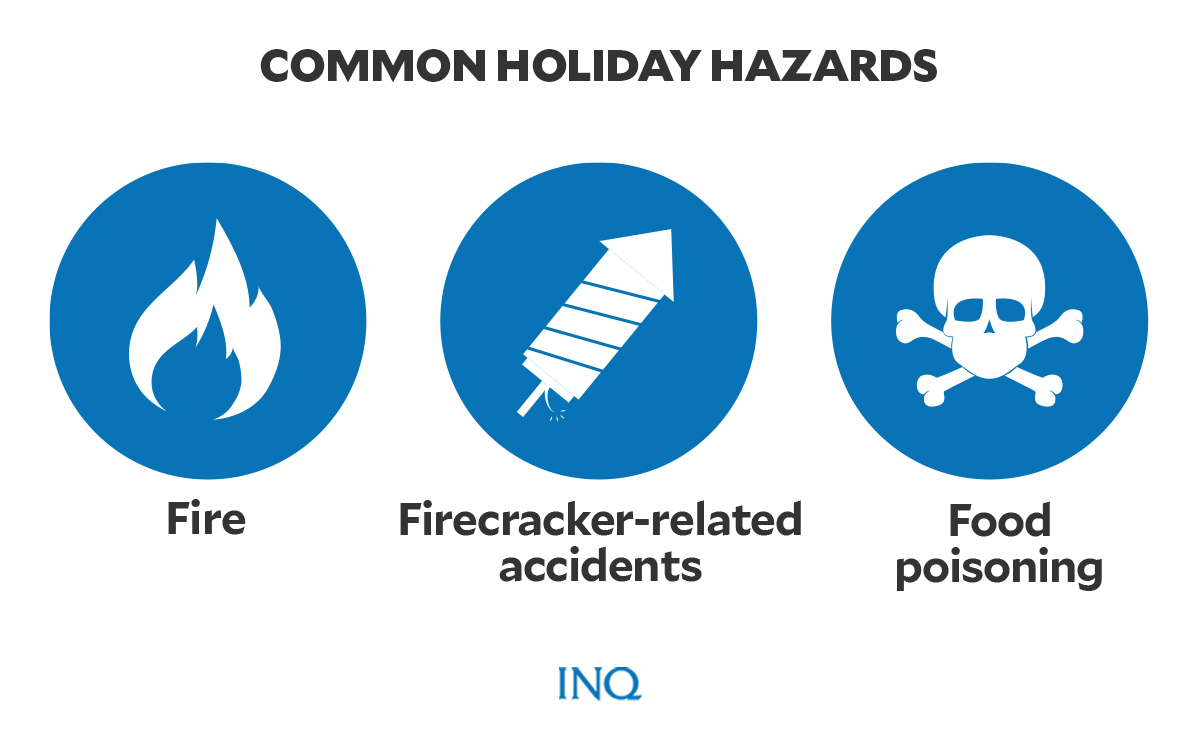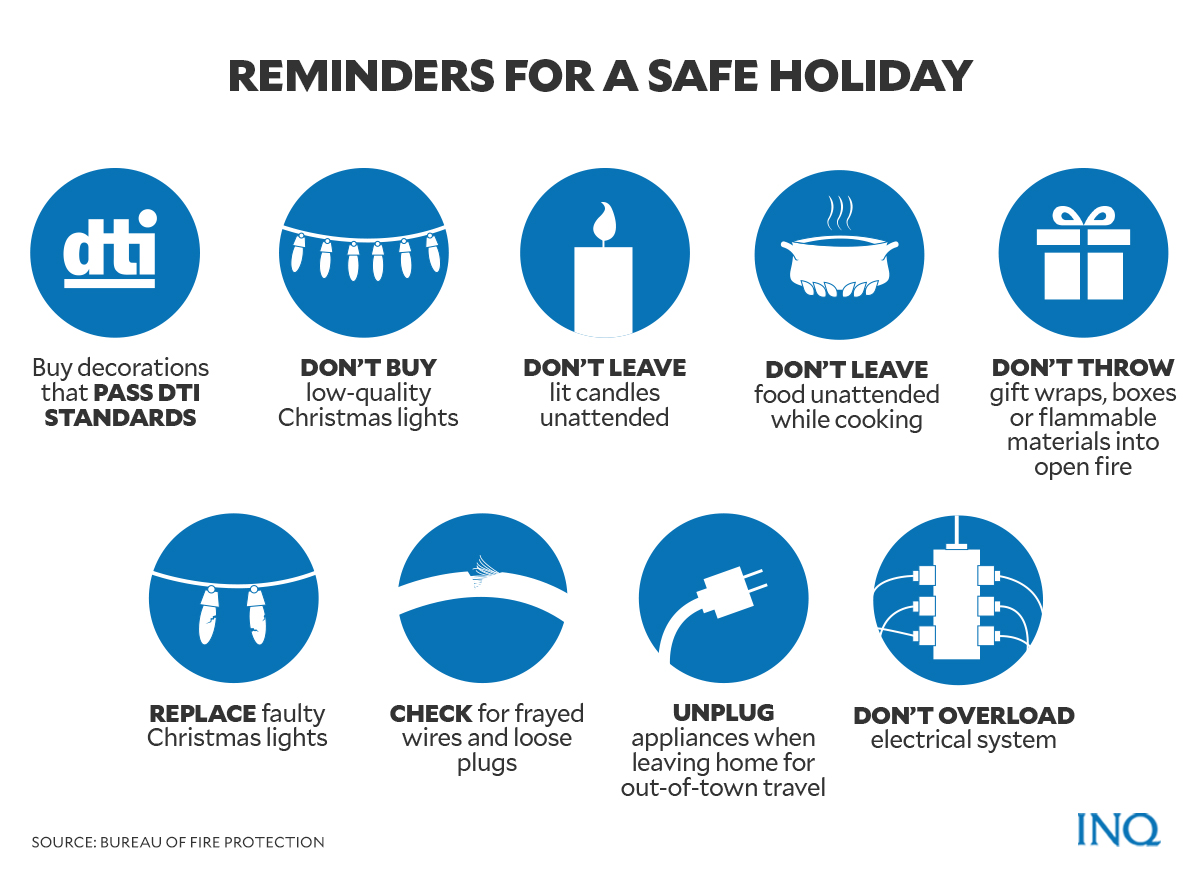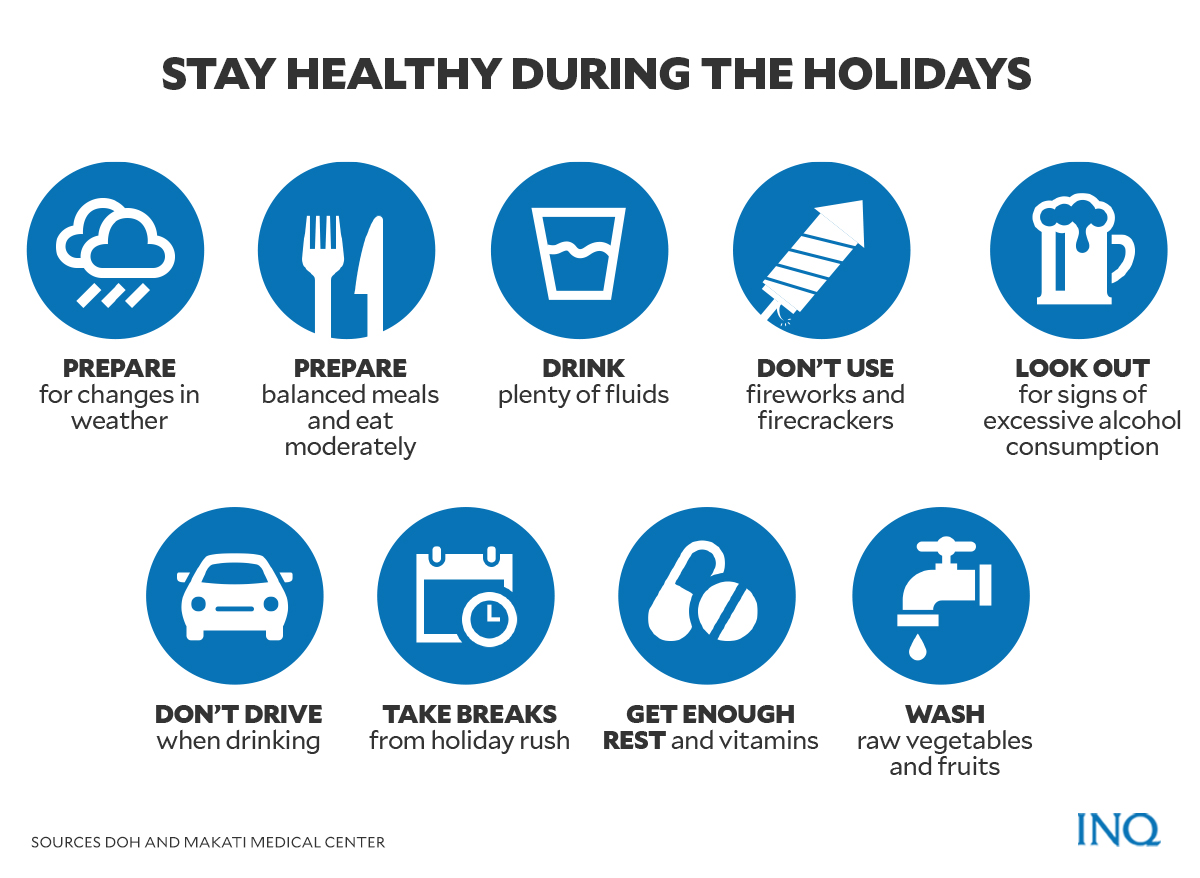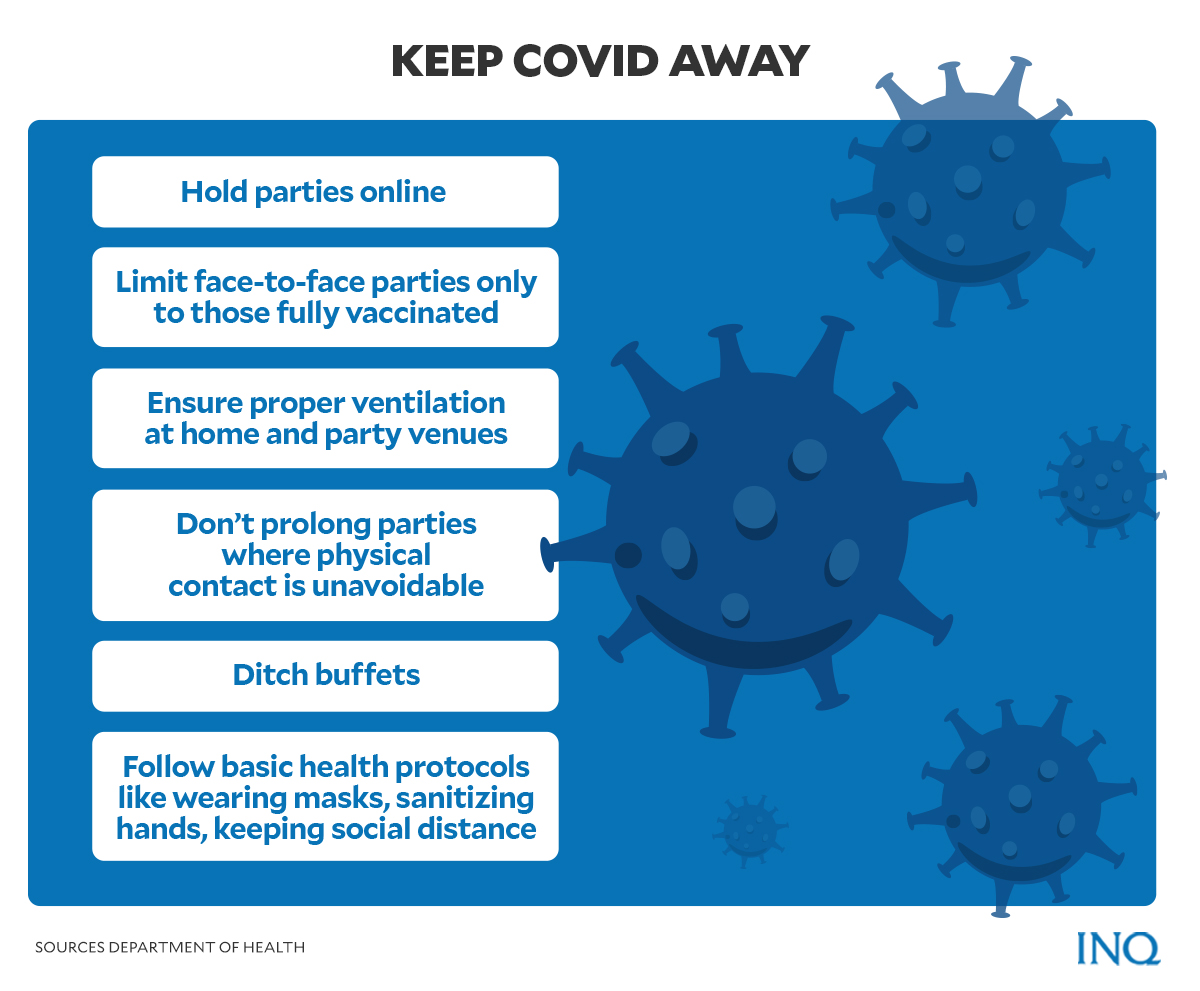Celebrating the holidays safe from hazards, COVID-19
MANILA, Philippines—For the second time, the Philippines will again observe the Holiday Hazards Prevention Month in the middle of the COVID-19 pandemic that continued to rage worldwide.
Aside from the common holiday hazards, people are reminded by top Philippine officials and health and medical experts to remain vigilant, responsible, and keep safe—especially amid the threats and risks brought by emerging COVID-19 variants.
Holiday hazards and COVID-19
The yearly commemoration of Holiday Hazards Prevention Month every December is part of the annual celebration of the Safety and Accident Prevention Year declared by Proclamation No. 115-A signed in 1966 by the late dictator Ferdinand Marcos.
The proclamation aims to promote “safety consciousness” in the midst of “indisputable evidence of a considerable rise in accident occurrence every year.”
It also promotes the notion that prevention is better than cure in various fields each month of the year.
“These accidents not only cause heavy financial losses and consequent economic dislocation among those affected and to our country at large but also immeasurable human suffering,” the proclamation stated.
READ: Home Safety Month: Keeping COVID and its dangers at bay
Prior to the COVID-19 pandemic, among the common hazards during holiday season in the Philippines were:
- Fire
- Firecracker-related accidents
- Food poisoning
Health-related hazards which, according to Makati Medical Center, were also usual during the festive season, included:
- Overindulging and intoxication
- Stress
- Holiday blues due to the “sudden barrage of activities and possibly the pressures of holiday expectations”
- Heart attacks
These typical hazards were unfortunately aggravated by the COVID-19 pandemic since last year, making the holidays tougher for most people in the country.
As of Dec. 6, the Department of Health (DOH) logged 543 new cases of COVID-19, bringing the total case count to 2,835,154.
Of the sum, 13,548 were tagged as active cases, 2,772,107 were recoveries, and 49,499 were deaths.
Avoid holiday hazards
To prevent the common holiday hazards from ruining holiday celebrations, experts had given some tips and information on how to celebrate safely.
The Department of the Interior and Local Government (DILG) in January this year reported that the country recorded zero firecracker-related fires in December 2020.
The agency said it was the first time there were no fires during the holidays since the establishment of the Bureau of Fire Protection (BFP).
Firecrackers were one of the leading causes of fires during holidays in the years before the pandemic. The DILG attributed the drop in cases to the government’s intensified information campaign against the use of firecrackers and fireworks.
Still, for extra precautionary measures, here are some previous reminders and guidelines from BFP for a fire-free holiday:
- Use decorations that pass the safety standards set by the Department of Trade and Industry (DTI) and look for the Import Commodity Clearance (ICC) mark, which is proof that the item complies with standards and is safe to use.
- Avoid purchasing low-quality, very cheap Christmas lights.
- Never leave lighted candles unattended.
- Never leave cooking food unattended.
- Never burn wrapping paper, boxes, or other trash in an open fire.
- Replace cracked, broken, or faulty holiday lights.
- Check for frayed wires and loose plugs.
- Unplug appliances when leaving home for an out-of-town trip or vacation.
- Refrain from overloading the electrical system.
To prevent health-related holiday hazards, the DOH and Makati Medical Center had given some health tips and advice.
To have a healthy holiday season, the DOH reminded the public to:
- Take care of each family member against possible changes in temperature which could cause cough, colds, and fever for both children and adults.
- Prepare well-balanced noche buena and media noche meals—which include vegetables and fruits alongside the traditional ham and queso de bola.
- Be kind to hearts and eat a moderate amount of nutritious food.
- Drink plenty of liquids like water and fruit juices.
- Have enough rest and sleep to avoid stress and exhaustion.
- Don’t use fireworks and firecrackers.
According to the Makati Medical Center, to avoid common health risks during holidays, the public should:
- Look out for signs of excessive consumption of liquor and other spirits which could lead to alcohol intoxication and in more severe cases, alcohol poisoning. These include dizziness, nausea, and loss of control of body movements and mental functions.
- Know limits when drinking alcoholic beverages and refrain from driving, cooking, operating machinery or equipment, or doing manual labor when drunk.
- Take breaks in between the holiday rush and engage in hobbies which could help in relaxation.
- Listen to the body and not overcommit.
- Get enough rest and take vitamins to boost the immune system.
- Consume food in moderation.
- Thoroughly cook chicken, beef, or pork meat.
- Wash raw vegetables and fruits, maintain good cooking hygiene in the kitchen to prevent contamination anD ensure proper food temperature during serving and storage.
READ: Food safety: How not to die or get sick while eating
Safer holidays amid pandemic
COVID-19 cases in the country have been going down since last month, based on data recorded by the DOH.
The DOH has also recently said there was no clustering of COVID-19 cases but which could indicate the presence of the new Omicron variant.
READ: No COVID-19 clusters in PH amid Omicron threat, says DOH
On Dec. 3, independent analytics group OCTA Research said Metro Manila is already at very low risk for COVID-19—with 138 average new cases from Nov. 26 to Dec. 2.
READ: Metro Manila now ‘very low risk’ for COVID-19 — OCTA Research
Still, despite the decreasing cases of COVID-19, the DOH continued to encourage the public to refrain from holding in-person celebrations.
Health Undersecretary Maria Rosario Vergeire, at a press briefing on Dec. 3, advised the public to hold online celebrations instead as COVID-19 remains a threat.
“Although the number of cases has been decreasing, we need to keep in mind that COVID is still here and we can still get infected or infect other people,” Vergeire said in Filipino.
“It is still best to hold virtual parties this Christmas, I know this is the second time we are celebrating Christmas differently, but hopefully we can do these kinds of sacrifices so we can prevent further infections in the community,” she added speaking partly in Filipino.
However, if some people prefer to push through with in-person celebrations, Vergeire urged them to strictly adhere to minimum public health standards and ensure that party-goers are already fully vaccinated against COVID-19.
“I advise to require that only fully vaccinated will attend the parties, that you will be holding this in an open space, and that everybody will be wearing their face mask, and practice social distancing,” said Vergeire.
She also urged the public to ditch serving food buffet-style.
“We can have plated dishes so there won’t be any congregation when you get the food at the buffet table and sharing of food.”
In a department circular released last year, the DOH listed some risk-mitigation measures for the public to adhere to during the holiday season, which included:
- Limit the number of people in social gatherings and activities.
- Avoid activities that may include traveling.
- Opt for activities with only a short duration of contact.
- Practice BIDA (B-bawal walang mask, I-i-sanitize ang mga kamay, D-dumistansya ng isang metro, A-alamin ang totoong impormasyon).
- Avoid contact with surfaces often touched by others
- Ensure proper ventilation in venues.
- Increase physical and mental resilience.
The Philippine National Police (PNP) continued to discourage the public from holding Christmas parties, due to risks brought by COVID-19 and its emerging variants.
“The PNP discourages the holding of traditional Christmas gathering among family members, co-workers, schoolmates, and circle of friends while the threat of COVID-19 and its variants continue to raise public health concerns,” said PNP chief Gen. Dionardo Carlos.
Former PNP chief Gen. Guillermo Eleazar also said that the National Capital Region Police Office (NCRPO) will remain vigilant as the public starts to occupy public areas during the holiday season.
“While our NCRPO personnel are still enforcing minimum public health standards, the police force focuses more on crime prevention, especially in areas frequented by the public,” Eleazar had said.
“Mainly, these include malls which are set to place longer operation hours,” he said speaking partly in Filipino.
TSB
READ: PNP to remain vigilant in NCR amid Alert Level 2, holidays
For more news about the novel coronavirus click here.
What you need to know about Coronavirus.
For more information on COVID-19, call the DOH Hotline: (02) 86517800 local 1149/1150.
The Inquirer Foundation supports our healthcare frontliners and is still accepting cash donations to be deposited at Banco de Oro (BDO) current account #007960018860 or donate through PayMaya using this link.





